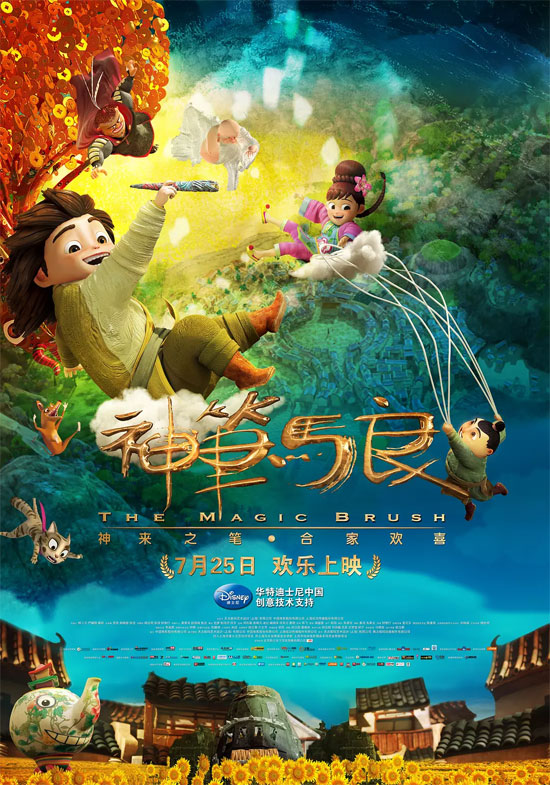Film Name: 神笔马良 / The Magical Brush

“The Magical Brush” is an origin—an origin brimming with infinite possibilities. Imagine the breathtaking grandeur of imagination when everything drawn by the divine brush comes to life.
This theme is practically tailor-made for animation. My mind already conjures visions of what a feast of imagination it would become if directed by Hayao Miyazaki or Disney. Admittedly, when our own animators tackle such a theme—one with vast room for expansion and rich possibilities—they still show a certain immaturity. This immaturity stems from a lack of truly deep exploration into the essence of the magical brush.
We can’t help but draw comparisons between today’s “The Magical Brush” and the Shanghai Animation Film Studio’s Russian puppet animation “The Magical Pen” from years past.
“The Magical Pen” was clearly a work guided by Marxist aesthetics, where the magical brush served the theme of class struggle. It carried a realist restraint—certain things Ma Liang simply couldn’t draw. For instance, the cat and mouse in this film. Every creation from his brush must serve the working-class and peasantry. In contrast, today’s “The Magical Brush” film transcends such class-based constraints, revealing a romantic, carefree spirit. This actually aligns more closely with Ma Liang’s character traits. A child who obtains such a magical brush would naturally want to indulge in “doing whatever he pleases” first—isn’t that only human?
The true value of the divine brush should be reflected in the protagonist’s transformation from acting on whim to discerning what to do and what not to do—shifting from the novelty of a creator to the responsibility of a creator. Unfortunately, the film’s Ma Liang never undergoes this clear arc of cognitive evolution.
I certainly don’t wish for the new Ma Liang to bear the heavy burden of “drawing for whom” (art serving whom) like the puppet Ma Liang did. But shouldn’t he also undergo a transformation from reckless curiosity to bewilderment at loss, then to renewed insight? Shouldn’t he experience a shift from causing trouble to creating happiness? Shouldn’t he progress from not knowing what to draw to finally knowing what to draw? As the saying goes, only a beautiful heart can paint beautiful pictures. Yet the Ma Liang in the film clearly skips these transformations. Even when escaping from the military truck, he doesn’t think to rescue his noodle-making buddy. His dialogue with the Ink Fairy after turning into ink lacks any truly inspiring, eye-opening moments. Ultimately, he still relies on others to escape the ink (rather than his own abilities and wisdom), leaving the impression that his essential “spiritual” coming-of-age journey remains unfinished from start to finish.
The ceremonial collapse of the golden mountain at the film’s conclusion carries a profound sense of ritual. Ma Liang and his friends’ rescue via the paper flying horse—a symbol of friendship—adds a poignant touch. Yet the village chief’s final gesture of treating villagers to a feast with gold that fell from the sky leaves a sour taste. Is this materialistic outlook truly the message the film intends to convey? The question of what matters more than money remains unanswered.
The Ink Immortal’s attempt to change the world by selecting a human spokesperson carries religious overtones. This raises a profound question: does the spokesperson fulfill the Ink Immortal’s will or their own? Can these two intentions ever truly align? On the other hand, as the creator, Ma Liang’s creations are implicitly bound to follow him—a code of conduct rooted in moral obligation. But is this bond truly unbreakable? Could Ma Liang conceivably draw something representing evil—after all, the Divine Brush was forged by sealing two ferocious divine beasts? What if he did? The discord between creator and creation is a recurring theme in media, much like how Majin Buu ultimately seeks to destroy the sorcerer Majin Buu—because media isn’t about harmony.
So you see, from the very origins of the Divine Brush Ma Liang narrative, we can truly cultivate a wealth of fascinating ideas.
Please specify:Anime Phone Cases » The Magical Brush 2014 Animation Film Review: An ungrown origin